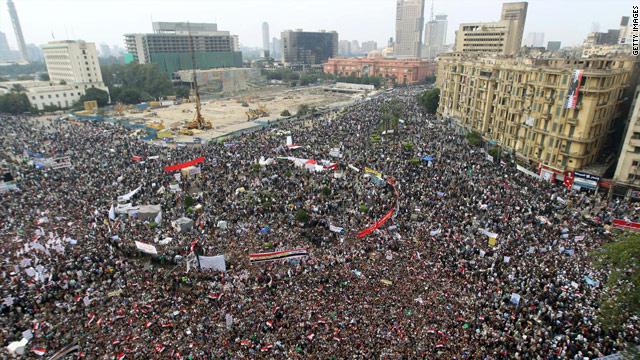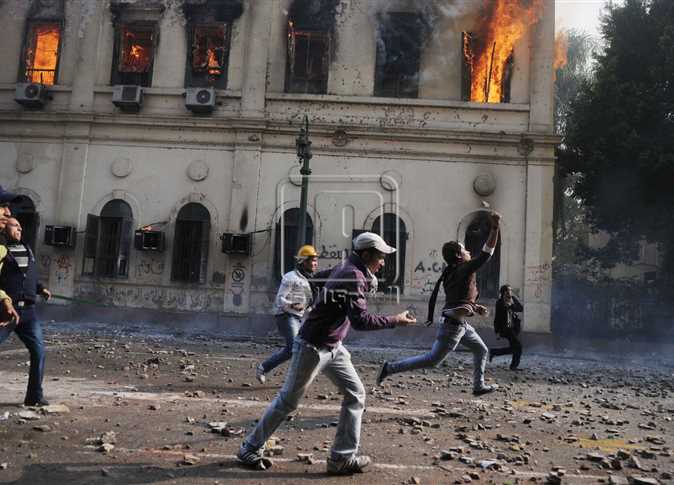
A three-judge court in Cairo has sentenced on Wednesday the deposed president Hosni Mubarak to three years in jail as he and his sons, who received four-year terms, were convicted of embezzling millions of pounds of public money to build and maintain the Mubarak’s private palaces.
Mubarak’s conviction shines light on the systematic corruption conducted by Mubarak, 86, at least, over an eight-year period that ended in his ouster in a popular revolution in 2011. Moreover, it implicate high-level officials in the Sisi-Installed government which includes the current prime minister and general intelligence director who facilitated the Mubarak’s loose embezzlement.
Mubarak and his sons were accused of stealing LE100 million (US$14 million) from the state budget, in response the court ordered them to pay penalties and make repayments totaling LE146 million ($20 million).
“Being a ruler of the country, he (Mubarak), instead of respecting the law and the constitution, unleashed himself and his sons a license to embezzle whatever they want from the public money without any oversight or regard,” Judge Osama Shaheen said in pronouncing the verdict on Wednesday. “To that end, they deserve to be punished.”
The three-year sentence is the second de facto indictment to Mubarak since his ouster in 2011. The first was two years ago when he was found guilty of charges related to directing the killing of hundreds of protesters during the 2011 uprising. But since the evidence was thin, the appeal court ordered his retrial and in 2012, Mubarak was released from prison hospital to live freely in a Maadi military hospital overlooking the Nile.
Given Mubarak has already spent 24 months in custody, lawyers think he is likely to be immediately released in this case. “The sentence appears low for such a serious charge, I suspect it is no coincidence that the three years happens to be the same amount of time Mubarak has been in prison,” says Sahar Aziz, professor of law at Texas A&M University School of Law.
“Therefore, if time served counts, then this conviction may free him, among the other cases against him do not require practical detention,” Ms. Aziz Said. Yet Mubarak’s lawyer Fareed al-Deeb said that he will appeal the verdict to acquit his client even if Mubarak is released.
But Mubarak’s cunning lawyer is likely to find it hard this time to find loopholes in this case to acquit his client before the appeal court as the evidence is far substantial as it is based on strong testimonies of participants in the fraud as well as piles of around 1007 original and forged receipts from 2013 to 2011.
The receipts were provided by Amr Khedr who was in charge of forging the embezzlement receipts at the presidency by instructions from the Mubaraks “I was following orders of the president and his family, I could not disobey, and I was told this was the system of work even before I was transferred to the president secretariat,” Khedr said to the prosecution after his arrest in March 2012.
Khedr who stands trial in Mubarak’s embezzlement case has exposed Mubarak’s complex network of corruption, providing all evidence to the prosecution.
In court filings, the prosecutors accused the Mubaraks of fraudulently billing the government for personal expenses such as five villas the family has in Sharm el-Sheikh resort, home furnishings, offices, interior design, private homes, kitchens, even a state-owned palace that was fraudulently transferred to Suzanne Mubarak’s property.
All expenses were illegally recorded as costs of work deducted from a budget allocated for presidential telecommunications system, maintained by state-owned Arab Contractors Company.
“We hope this is the first step to hold Mubarak and his cronies accountable for corruption crimes they committed” said Michael Termini, Corporate & Financial Accountability Deputy Director at GAP (Washington-based Government Accountability Project).
Termini is investigating other cases at the international level, including charges of corruption caused by devaluating and selling Omar Effendi chain by a team led by Mubarak’s minister of investment Mahmoud Mohieldin who is currently working with the World Bank in the US.
Mubarak’s verdict came few days before a pro forma elections where former military general Abdel Fattah al-Sisi is most likely to win after overthrowing the Muslim brotherhood president Mohamed Morsy from power on 3 July 2013.
Some activists view Mubarak’s conviction as a maneuver from Sisi to disassociate his coming administration from Mubarak’s regime, especially after the widely circulated claims from the opposition that Sisi is a Trojan horse who is going to usher a comeback to Mubarak’s regime, given the return of heavy-handed crackdown of the government on anti-military activists from across the spectrum.
Claims of Mubarak’s police state returning has become more apparent with the police intolerance of any protests that had before worked on overthrowing two presidents in less than two years, and the controversial judiciary verdicts of mass death sentences which stirred questions about the independence of the judiciary and finally, the media companies and businessmen who had strong interests with Mubarak’s corrupt regime are having the same interests with the upcoming Sisi administration.
In that sense “acquitting Mubarak this time could be negative propaganda to Sisi,” said Mohamed Al-Gohry. And “if Mubarak is acquitted in all charges, there will be a political backlash against Sisi,” said Sahar Aziz.
In another corruption case, Mubarak still faces another a charge related to receiving gifts from state-owned Al-Ahram media institution worth millions of pounds during 2006-2011 period.
But in January 2013, Mubarak offered paying LE18 million ($2.8 million) for gifts he received. Other Mubarak officials investigated collectively paid LE30 million back in return for similar gifts. The gifts included jewelry, watches, ties, leather bags and belts.
High-ranking officials involved in Mubarak’s corruption case
Based on testimonies, including Khedr’s detailed explanation along with other evidence, the prosecution concluded Arab Contractors during the period from 2003 to 2012 had facilitated in diverting money from state funds to Mubarak’s private properties.
The head of the company during this time was the current Prime Minister Ibrahim Mehlib who served as the CEO and chairman of the board of the giant company since 2001, let alone, he was also a high-level member of Mubarak’s dissolved National Democratic Party, and in 2010, Mehleb was one of 44 Shura Council members directly appointed by Mubarak.
After resigning from the company in 2012, Mehleb, like many officials close to Mubarak regime, left the country to Saudi Arabia where he was called up by the Egyptian prosecution in 2013 to give his testimony concerning his supervision on the mausoleum built for Mubarak’s grandson who had died in May 2009.
Mehleb’s lawyer, according to an article by Salah Montasser in state-owned newspaper Al-Ahram, advised him to remain in Saudi Arabia to avert any legal prosecution, meantime, he was called by Beblawy’s cabinet formed after Morsy ouster to get back to Egypt and when he arrived at Cairo airport, he headed directly to meet the prime minister and take an oath as a housing minister, in less than a year, Mehleb became a prime minster, replacing Beblawy.
According to MadaMasr online, the watchdog officer Moatasem Fathy, who investigated the case and referred it to prosecution said, “It is unbelievable to assume that the state-owned company spent all these amounts of money during eight-year-period on Mubarak family palaces without the knowledge of its chairman.”
Fathy ruled out that Mehleb might have gained personally from embezzlement crime but “he was part of regime who ignored the fact that the regime was corrupt.”
Fathy, a veteran investigator with the state-run Administrative Oversight Authority, had risked his job when he built this case against Mubarak, he included the name of the Gen. Mohamed Farid el-Tohamy who was then the head of the military-dominated watchdog, accusing him of suppressing the investigation and covering up the evidence to protect the Mubaraks and other senior officials from scrutiny.
In January 2011, Fathy resigned from his job as he claims punitive measures are made against him for investigating Mubarak’s corruption, and after the outbreak of the 2011 uprising, he decided to refer his investigations to the public prosecutor, “I thought that with Mubarak’s ouster, everything will change, but the revolution did not have a chance to rule” he said.
Gen. Tohamy who was fired from the watchdog by Morsy in 2012, was appointed in 2013, after Morsy ouster for the top security position in the country where he serves as the chief of the General Intelligence. Shortly after holding the position, Gen. Tohamy practiced his old suppression against Fathy by transferring him to a lower desk position away from Cairo.
State-run Akhbar al-Youm paper quoted Colonel Fathy as saying that the officials he exposed is behind a campaign of intimidation “to scare me and push me to leave the country,”
Given that 40 percent of Egyptians live under poverty line “why the Mubaraks needed to bill the money of citizens for their personal expenses, both Gamal and Alaa had big fortunes from their investments, their wives are coming from wealthy families” Fathy was wondering as the Mubaraks were in no need for money to steal the poor money.




